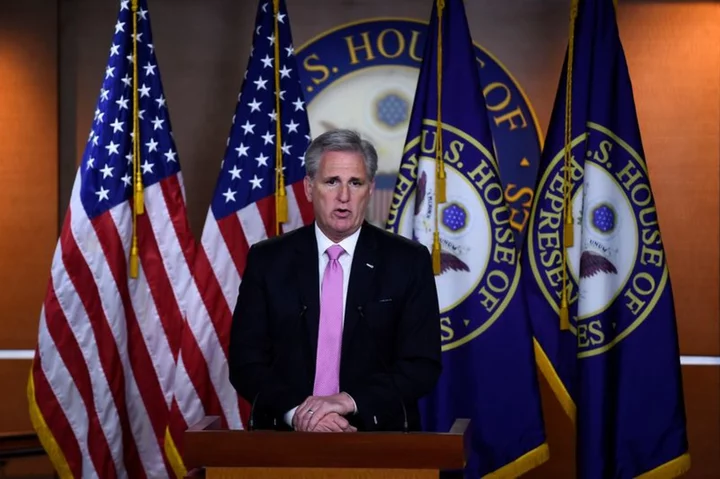
Poland to stop supplying weapons to Ukraine over grain row
It comes as tensions rapidly escalate between the two countries - historically close allies.
2023-09-21 13:21

Nova Scotia wrestles with aftermath of devastating floods
By Nia Williams Canada's East Coast province of Nova Scotia began cleaning up on Sunday after torrential rainfall
2023-07-24 04:58

John Boyega says he's 'gonna keep calling' Jamie Foxx till the actor responds: 'He better pick up'
Jamie Foxx's co-star from 'They Cloned Tyrone', John Boyega, admitted that he had expected the actor to show up for the film's premiere
2023-06-16 16:29

Jurgen Klopp: Liverpool better prepared for Europa League now than in 2016
Liverpool manager Jurgen Klopp insists they are in the Europa League to win it and they arrive in Linz “to compete, not to give opportunities”. On Thursday the Reds take on LASK as they return to a competition in which their last appearance was the 2016 final defeat to Sevilla in the German’s first season at the club. Since then Liverpool have won the Champions League and reached two other finals and lifted the Premier League, the Club World Cup, the FA Cup and Carabao Cup. As it stands the Europa League is the only major trophy Klopp has not won in his near-eight years at Anfield and he wants to add that missing silverware to his honour role. That means fans who were hoping to see exciting fringe talents like youngster Ben Doak, Harvey Elliott and new signing Ryan Gravenberch may have to wait for now. “We are here to compete, not to give opportunities,” he said. “My first year I thought the Europa League was a bit too much for us until we got to the final. We had to fly to Russia, played on a frozen pitch in Sion. “That was a different squad. We were not ready and we came through somehow. I don’t think we were exceptional until the quarter-final, semi-final. “It is a different time, a different team. We are better prepared. We enjoy it more to be here because we had no clue at that time what to expect. “We have to be motivated and we are excited to play in the Europa League. I didn’t watch the Champions League (this week), I didn’t miss the anthem.” None of the 2016 final squad remain at Anfield with Joe Gomez – who was 18 at the time but out injured – the only current player to have played in the Europa League for Liverpool. But while there have been significant alterations to the playing staff this summer the core of that trophy-winning band are still together and Klopp’s side are favourites to win the competition. However, captain Virgil van Dijk brushed off the expectations. “It’s a reflection of the world we live in at the moment, it’s from one extreme to the other,” he said. “We have to just stay calm and level-headed, there are so many games to play and twists and turns to happen. “We know we had a good start but there are so many things still we need to improve. We need to stay calm. “Everyone else from the outside world will say things but we should not worry and think about it.” Van Dijk has had to watch from the sidelines for the last two matches due to suspension but he has been impressed with the way his team-mates have gone about their business. And he is not the only one who has been heartened. Klopp added: “Virgil is right. He did not play now twice and you can see something is growing. “We were late (arriving in Linz) today and it wasn’t our fault and we were waiting around and you see they enjoy spending time with each other.” Read More Charity boss speaks out over ‘traumatic’ encounter with royal aide Ukraine war’s heaviest fight rages in east - follow live Next season I’ll be back – Emma Raducanu out for rest of year through injury Majority of Spain’s World Cup winners reach agreement to end boycott – CSD boss Van Dijk dunks and Zlatan shows off – Wednesday’s sporting social
2023-09-21 03:50

Ionescu and Laney help Liberty beat Sun 84-77 to even semifinals series at 1-1
Sabrina Ionescu scored 21 points and Betnijah Laney added 20 to help the New York Liberty beat the Connecticut Sun 84-77, evening the best-of-five series at 1-1
2023-09-27 11:20

Vunipola red-carded for England in 29-10 loss to Ireland in Rugby World Cup warmup
England’s preparations for the Rugby World Cup have been plunged into further chaos after Billy Vunipola was red-carded for a dangerous tackle in a 29-10 loss to top-ranked Ireland in a warmup match illuminated by a stunning late try by Keith Earls
2023-08-20 02:58

'Suits' streaming so successful new show being planned
"Suits" has been highly rated on Netflix and now a new show is reportedly in the works.
2023-10-14 00:22

Former Connecticut lawmaker, a gambling addict, gets 27 months for stealing coronavirus aid
A former Connecticut state representative has been sentenced to 27 months in prison for stealing more than $1.2 million from the city of West Haven
2023-06-01 00:58

Sage Therapeutics to cut 40% of jobs after depression drug setback
Sage Therapeutics said on Thursday it would cut its workforce by about 40%, weeks after the U.S. health
2023-08-31 18:49

'Dad. They shot me. Help': Surviving the Kfar Aza kibbutz massacre
Neta had not spoken to her father for years, but she knew he was the only person who could save her.
2023-10-13 14:48

Walgreens walkout: Your pharmacy might be closed next week
Employees at two of the largest drugstore chains in the United States say harsh working conditions make it difficult to safely fill prescriptions, which could put the health of their customers at risk. Now, they're demanding change by staging a series of walkouts across the country.
2023-10-07 07:53

Freddie Mercury bangle sets record for rock star jewelry in auction of his prized possessions
A Victorian-style silver snake bangle Freddie Mercury wore with an ivory satin catsuit in the “Bohemian Rhapsody” video has sold for the highest price ever paid for a piece of jewelry owned by a rock star
2023-09-07 02:56
You Might Like...

What is spasmodic dysphonia? Campaign-bound Robert F Kennedy Jr took botox shots to make sure his voice does not worsen

Tonga's Piutau ready to follow idol Lomu and make World Cup impact

Preseason MVP: Jordan Love gives Packers fans flashes of Aaron Rodgers-like greatness

Republican McCarthy warns: 'Nobody wins in a government shutdown'

Deshaun Watson makes Browns-Josh Dobbs trade look even worse

‘The View’ co-host Ana Navarro shows off serene beauty of Patmos Island as she spends day swimming in sea

Mitch Rossell wins hearts with OG song dedicated to family as 'AGT' judge Simon Cowell calls singer 'the real deal'

The bond and stock markets might finally agree on Fed expectations
